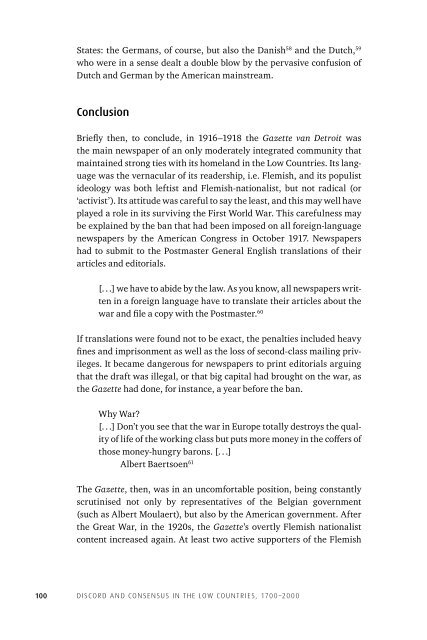Discord Consensus
7aze300jFJo
7aze300jFJo
You also want an ePaper? Increase the reach of your titles
YUMPU automatically turns print PDFs into web optimized ePapers that Google loves.
States: the Germans, of course, but also the Danish 58 and the Dutch, 59<br />
who were in a sense dealt a double blow by the pervasive confusion of<br />
Dutch and German by the American mainstream.<br />
Conclusion<br />
Briefly then, to conclude, in 1916–1918 the Gazette van Detroit was<br />
the main newspaper of an only moderately integrated community that<br />
maintained strong ties with its homeland in the Low Countries. Its language<br />
was the vernacular of its readership, i.e. Flemish, and its populist<br />
ideology was both leftist and Flemish-nationalist, but not radical (or<br />
‘activist’). Its attitude was careful to say the least, and this may well have<br />
played a role in its surviving the First World War. This carefulness may<br />
be explained by the ban that had been imposed on all foreign-language<br />
newspapers by the American Congress in October 1917. Newspapers<br />
had to submit to the Postmaster General English translations of their<br />
articles and editorials.<br />
[. . .] we have to abide by the law. As you know, all newspapers written<br />
in a foreign language have to translate their articles about the<br />
war and file a copy with the Postmaster. 60<br />
If translations were found not to be exact, the penalties included heavy<br />
fines and imprisonment as well as the loss of second-class mailing privileges.<br />
It became dangerous for newspapers to print editorials arguing<br />
that the draft was illegal, or that big capital had brought on the war, as<br />
the Gazette had done, for instance, a year before the ban.<br />
Why War?<br />
[. . .] Don’t you see that the war in Europe totally destroys the quality<br />
of life of the working class but puts more money in the coffers of<br />
those money-hungry barons. [. . .]<br />
Albert Baertsoen 61<br />
The Gazette, then, was in an uncomfortable position, being constantly<br />
scrutinised not only by representatives of the Belgian government<br />
(such as Albert Moulaert), but also by the American government. After<br />
the Great War, in the 1920s, the Gazette’s overtly Flemish nationalist<br />
content increased again. At least two active supporters of the Flemish<br />
100<br />
DISCORD AND CONSENSUS IN THE LOW COUNTRIES, 1700–2000


